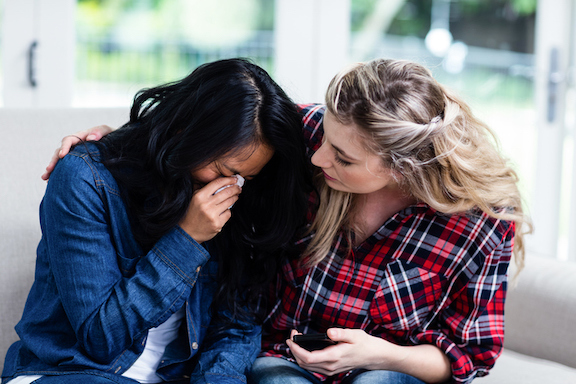The Power of Tears
By Dr. Margaret PaulSeptember 07, 2010
Discover the difference between victim pain and authentic pain and how expressing your authentic tears can open you to joy.
 "Those who do not know how to weep with their whole heart don't know how to laugh either." - Golda Meir
"Those who do not know how to weep with their whole heart don't know how to laugh either." - Golda Meir
Do you have a lid on your tears? Do you also have a hard time laughing with your whole body?
Our tears are a God-given way of expressing sadness, just as laughter is a God-given way of expressing fun and joy. Both laughter and tears release stress in loving ways, rather than having to release it through anger or through holding it in your body, which can eventually cause physical pain and illness.
However, there are two kinds of tears, wounded tears and authentic tears
Wounded Tears
Wounded tears are the tears we express when we are feeling like a victim. Wounded tears come from the pain that we are causing ourselves with our own self-abandonment. When we do not take loving care of our own feelings - instead ignoring our feelings, judging them, and avoiding them with various addictions - we might then project on to others that they are abandoning us and are the cause of our emotional pain.
Wounded victim tears are a manipulation of others, trying to make others feel guilty and responsible for you. The hope of wounded tears is that the other person will feel sympathy and pity for you, and give you the love and attention that you are not giving to yourself. Wounded tears are a way of avoiding personal responsibility for yourself - emotionally, physically, and spiritually.
Wounded tears are a bottomless pit. Because they are being caused by your own self-abandonment, your misery will not go away until you choose to take responsibility for your self.
When you are at the other end of another's wounded tears, you might feel put off by them. This is a normal reaction to the manipulation and is not an indication that you are a heartless person. When you don’t feel moved by another's tears, there is a good chance that it is because their tears are trying to make you feel guilty and responsible for them.
Authentic Tear
Authentic tears are the tears we express when we are feeling the heartache, heartbreak, sadness, sorrow, or grief of life. The pain behind these tears is not from how we are treating ourselves, but from the painful events of life - the heartbreak of childhood abuse, of the loss of a loved one, the loneliness and heartache of being at the other end of another's meanness, the fear and grief over the loss of a job or loss of financial security, the heartbreak and grief of shattered dreams, the sorrow of seeing others' suffering or seeing peoples' unlovingness toward each other, and so on.
Authentic tears come from an open heart. When you are in the presence of someone who is in authentic pain, you generally feel moved to comfort them. If your own heart is open, you will likely feel their pain within you as you empathize with their feelings, and tears might come to your eyes.
It is vitally important to be able to express your authentic pain. When you put a lid on your authentic pain, the pain has to go somewhere, and it often goes into the muscles of your body, causing things like neck and back pain. The repression of authentic pain can cause so much stress in the body that your immune system is suppressed, which can eventually contribute to illnesses such as heart disease and cancer.
Authentic pain and true joy exist in the same place within your heart. When you put a lid on authentic pain, you also put a lid on authentic joy. If your life feels somewhat colorless, consider learning how to open to your authentic pain and you will discover your laughter and joy.
Join Dr. Margaret Paul for her 30-Day at-home Course: "Love Yourself: An Inner Bonding Experience to Heal Anxiety, Depression, Shame, Addictions and Relationships."
 Send this article to a friend
Send this article to a friend  Print this article
Print this article  Bookmarked 4 time(s)
Bookmarked 4 time(s)
| Related Articles |
|---|
| Hurt Feelings vs. Hurt Heart |
| Core Sadness vs. Wounded Sadness |
Comments
| Author | Comment | Date |
|---|---|---|
| Join the Inner Bonding Community to add your comment to articles and see the comments of others... | ||

Daily Inspiration
Be mindful of your energy. The energy of every thought, every word, and every action, affects the whole of consciousness. Today, be conscious of pouring loving thoughts, actions and words into the Oneness of Spirit.
By Dr. Margaret Paul

 Share with Del.icio.us
Share with Del.icio.us Share with Digg
Share with Digg






